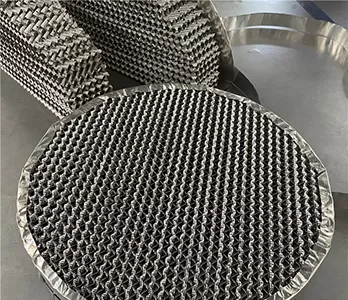Can structured packing Be Inspected and Cleaned?
Yes, structured packing can and should be inspected and cleaned as part of regular maintenance to ensure optimal performance in industrial separation processes. Over time, packing may accumulate fouling, deposits, or contaminants due to prolonged operation, which can reduce mass transfer efficiency, increase pressure drop, or even cause blockages. Proper inspection and cleaning help restore its functionality and extend its service life.

Inspection Practices
Routine inspection of structured packing involves checking for signs of fouling, corrosion, damage, or misalignment. This can be done during scheduled shutdowns by accessing the tower or vessel where the packing is installed. Inspectors look for accumulated solids, scale, or chemical residues on the packing surfaces, as well as any physical damage such as bent corrugated sheets, broken mesh, or loosened connections. For hard-to-reach areas, tools like borescopes may be used to assess internal conditions without full disassembly.
Cleaning Methods
The choice of cleaning method depends on the type of fouling, packing material, and degree of contamination:
- Water rinsing: For light fouling or loose debris, high-pressure water rinsing is often effective. This method is gentle and suitable for most materials, including metal, plastic, and ceramic packing, as it removes surface contaminants without damaging the structure.
- Chemical cleaning: For stubborn deposits like scale, mineral buildup, or organic residues, chemical cleaners (such as acids, alkalis, or solvents) may be used. Acid washing is common for metal or ceramic packing to dissolve inorganic scale, while alkaline solutions are effective against organic fouling. It is critical to select chemicals compatible with the packing material—for example, avoiding strong acids for plastic packing to prevent degradation.
- Mechanical cleaning: In cases of severe fouling, mechanical methods like brushing or scraping may be used, but this must be done carefully to avoid damaging the delicate structure of the packing, especially for mesh or fine corrugated types.
Material-Specific Considerations
- Metal structured packing: Can withstand more aggressive cleaning methods, including acid washing and high-pressure water jets, due to its durability and corrosion resistance (depending on the metal type).
- Plastic structured packing: Requires milder cleaning to prevent chemical damage or warping. Water rinsing or mild alkaline solutions are preferred over strong acids or high temperatures.
- Ceramic structured packing: Tolerates acid and alkaline cleaning but should be handled gently to avoid cracking or chipping during mechanical cleaning.
Importance of Maintenance
Regular inspection and cleaning prevent performance degradation, reduce energy consumption, and minimize the risk of unexpected downtime. By addressing fouling early, operators can maintain uniform gas-liquid distribution, ensure efficient mass transfer, and prolong the operational life of the structured packing.
In summary, structured packing requires regular inspection and cleaning as part of maintenance protocols. With appropriate methods tailored to the packing material and fouling type, cleaning effectively restores its performance and ensures reliable operation in industrial processes.

